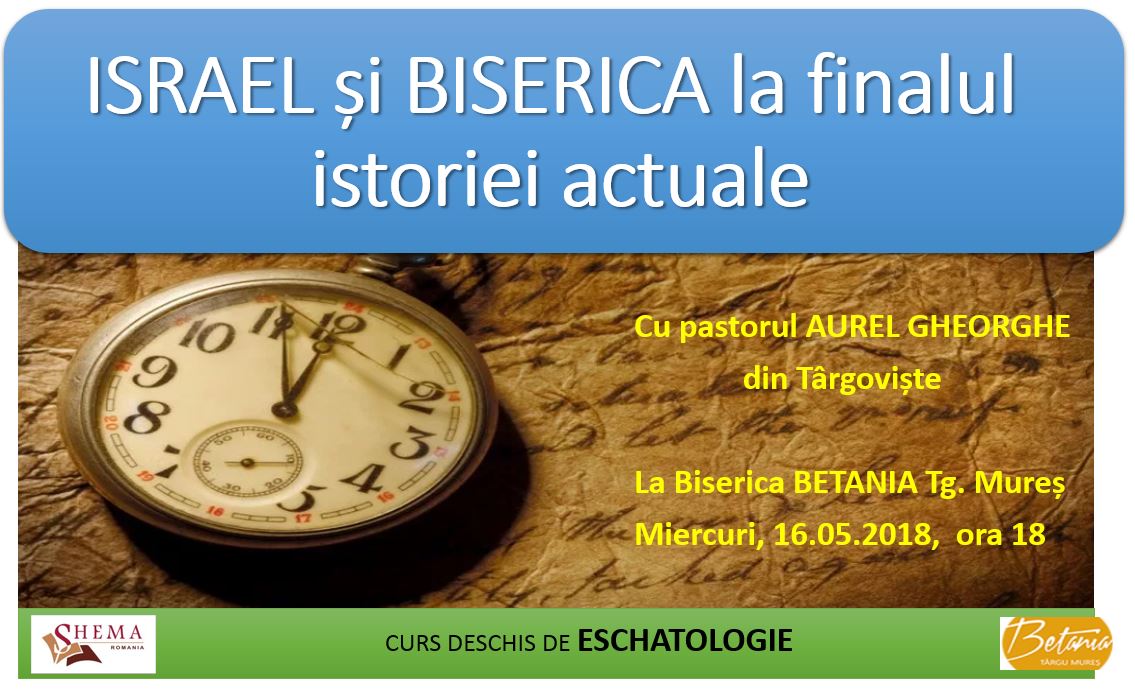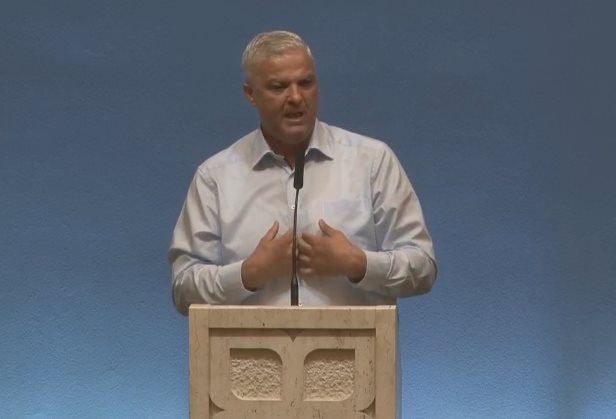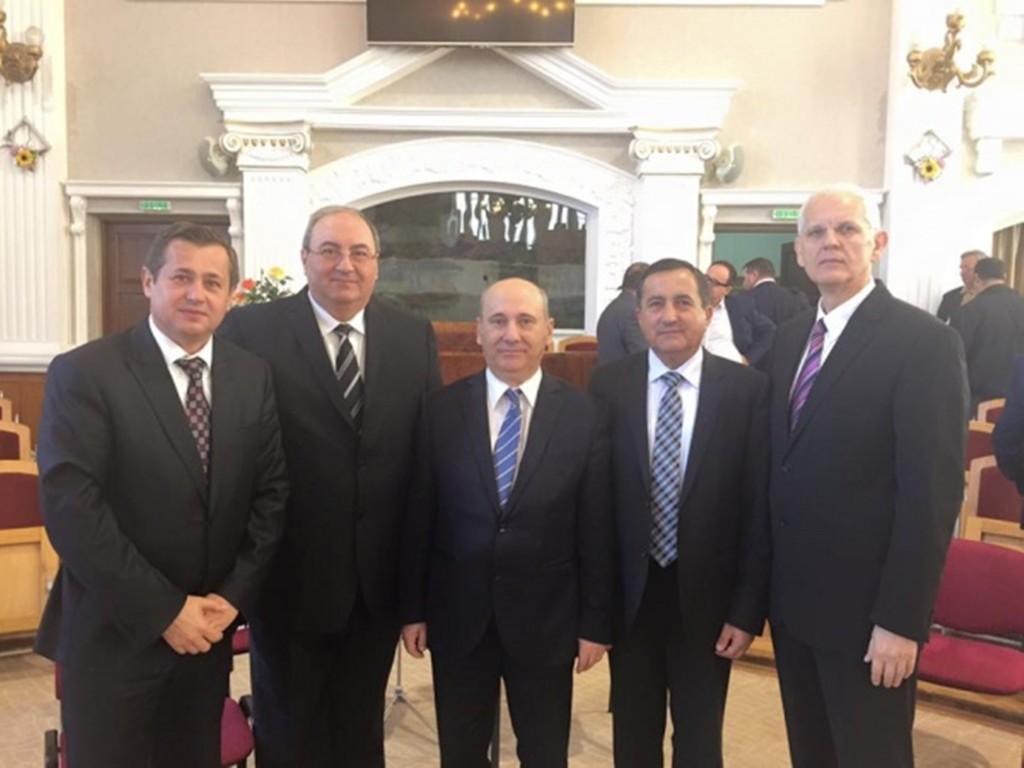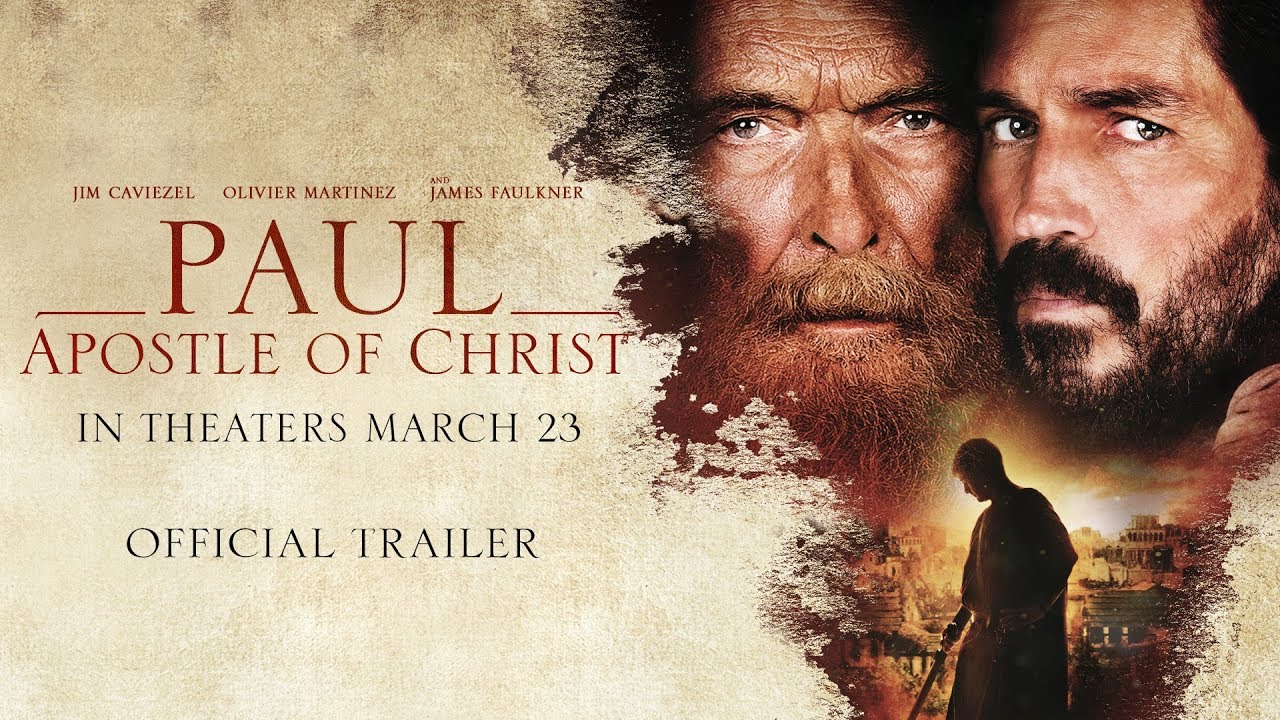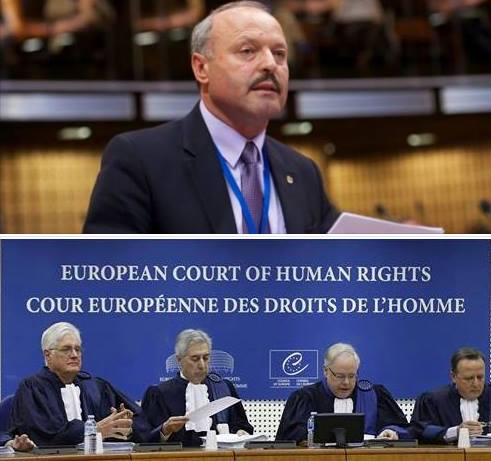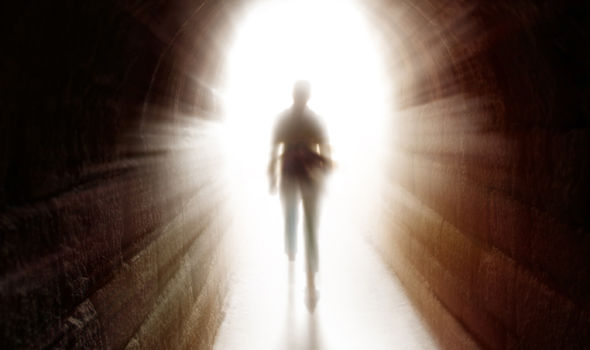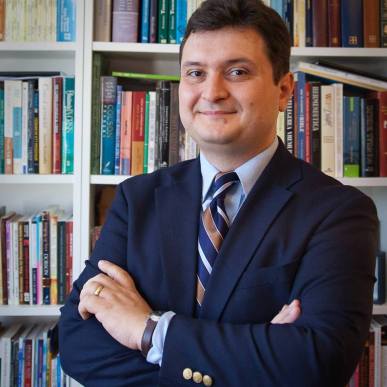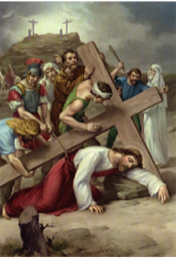 Charles Haddon (C.H.) Spurgeon (June 19, 1834 January 31, 1892) was a British Reformed Baptist preacher who remains highly influential among Christians of different denominations, among whom he is still known as the „Prince of Preachers.” In his lifetime, Spurgeon preached to around 10,000,000 people, often up to 10 times a week at different places. His sermons have been translated into many languages. Spurgeon was the pastor of the New Park Street Chapel in London for 38 years. In 1857, he started a charity organization called Spurgeon’s which now works globally. He also founded Spurgeon’s College, which was named after him after his death.
Charles Haddon (C.H.) Spurgeon (June 19, 1834 January 31, 1892) was a British Reformed Baptist preacher who remains highly influential among Christians of different denominations, among whom he is still known as the „Prince of Preachers.” In his lifetime, Spurgeon preached to around 10,000,000 people, often up to 10 times a week at different places. His sermons have been translated into many languages. Spurgeon was the pastor of the New Park Street Chapel in London for 38 years. In 1857, he started a charity organization called Spurgeon’s which now works globally. He also founded Spurgeon’s College, which was named after him after his death.
Spurgeon was a prolific author of many types of works including sermons, an autobiography, a commentary, books on prayer, a devotional, a magazine, and more. Many sermons were transcribed as he spoke and were translated into many languages during his lifetime. Arguably, no other author, Christian or otherwise, has more material in print than C.H. Spurgeon.
Special Thanksgiving to the Father
This message was preached on February 15, 1860. The sermon is prefaced by a letter, which Mr. Spurgeon wrote in June of that same year, as he was on the continent. This is the letter:
MY DEAR BRETHREN,
 I have journeyed happily to the borders of Switzerland, and already feel that the removing of the yoke from the shoulder is one of the readiest means of restoring the metal powers. Much of Popish superstition and idolatry has passed under my observation, and if nothing else could make me a Protestant, what I have seen would do so. One thing I have learned anew, which I would have all my brethren learn, the power of a personal Christ. We Protestants are too apt to make doctrine everything, and the person of Christ is not held in sufficient remembrance; with the Roman Catholic doctrine is nothing, but the person is ever kept in view. The evil is, that the image of Christ before the eye of the Papist is carnal and not spiritual; but could we always keep o’er Lord before our eyes, his spiritual sense, we should be better men than any set of doctrines can ever make us. The Lord give to us to abide in him and so to bring forth much fruit.
I have journeyed happily to the borders of Switzerland, and already feel that the removing of the yoke from the shoulder is one of the readiest means of restoring the metal powers. Much of Popish superstition and idolatry has passed under my observation, and if nothing else could make me a Protestant, what I have seen would do so. One thing I have learned anew, which I would have all my brethren learn, the power of a personal Christ. We Protestants are too apt to make doctrine everything, and the person of Christ is not held in sufficient remembrance; with the Roman Catholic doctrine is nothing, but the person is ever kept in view. The evil is, that the image of Christ before the eye of the Papist is carnal and not spiritual; but could we always keep o’er Lord before our eyes, his spiritual sense, we should be better men than any set of doctrines can ever make us. The Lord give to us to abide in him and so to bring forth much fruit.
Baden-Baden, June 15th, 1860 C. H. Spurgeon
You can read the sermon, from Spurgeon.org below this video, or you can listen to the sermon being read here, on this VIDEO by Christian Praise and Worship in Songs, Sermons, and Audio Books
There is also a video playlist of Spurgeon sermons available here –
Charles Spurgeon Sermons Playlist 2: http://www.youtube.com/playlist?list=…
A Sermon(No. 319)
Delivered on Sabbath Evening, January 15th, 1860, by the
REV. C.H. SPURGEON
At New Park Street Chapel, Southwark.
„Giving thanks unto the Father, which hath made us meet to be partakers of the inheritance of the saints in light: who hath delivered us from the power of darkness, and hath translated us into the kingdom of his dear Son.”—Colossians 1:12, 13.
THIS PASSAGE IS A MINE of riches. I can anticipate the difficulty in preaching and the regret in concluding we shall experience this evening because we are not able to dig out all the gold which lies in this precious vein. We lack the power to grasp and the time to expatiate upon that volume of truths which is here condensed into a few short sentences.
 We are exhorted to „give thanks unto the Father.” This counsel is at once needful and salutary. I think, my brethren, we scarcely need to be told to give thanks unto the Son. The remembrance of that bleeding body hanging upon the cross is ever present to our faith. The nails and the spear, his griefs, the anguish of his soul, and his sweat of agony, make ouch tender touching appeals to our gratitude—these will prevent us always from ceasing our songs, and sometimes fire our hearts with rekindling rapture in praise of the man Christ Jesus. Yes we will bless thee, dearest Lord; our souls are all on fire. As we survey the, wondrous cross, we cannot but shout—
We are exhorted to „give thanks unto the Father.” This counsel is at once needful and salutary. I think, my brethren, we scarcely need to be told to give thanks unto the Son. The remembrance of that bleeding body hanging upon the cross is ever present to our faith. The nails and the spear, his griefs, the anguish of his soul, and his sweat of agony, make ouch tender touching appeals to our gratitude—these will prevent us always from ceasing our songs, and sometimes fire our hearts with rekindling rapture in praise of the man Christ Jesus. Yes we will bless thee, dearest Lord; our souls are all on fire. As we survey the, wondrous cross, we cannot but shout—
„O for this love let rocks and hills
Their lasting silence break,
And all harmonious human tongues
The Savior’s praises speak.”
It is in a degree very much the same with the Holy Spirit. I think we are compelled to feel every day our dependence upon his constant influence. He abides with us as a present and personal Comforter and Counsellor. We, therefore, do praise the Spirit of Grace, who hath made our heart his temple, and who works in us all that is gracious, virtuous, and well-pleasing in the sight of God. If there be any one Person in the Trinity whom we are more apt to forget than another in our praises, it is God the Father. In fact there are some who even get a wrong idea of Him, a slanderous idea of that God whose name is LOVE. They imagine that love dwelt in Christ, rather than in the Father, and that our salvation is rather due to the Son and the Holy Spirit, than to our Father God. Let us not be of the number of the ignorant, but let us receive this truth. We are as much indebted to the Father as to any other Person of the Sacred Three. He as much and as truly loves us as any of the adorable Three Persons. He is as truly worthy of our highest praise as either the Son or the Holy Spirit.
 A remarkable fact, which we should always bear in mind, is this:—in the Holy Scriptures most of the operations which are set down as being the works of the Spirit, are in other Scriptures ascribed to God the Father. Do we say it is God the Spirit that quickens the sinner who is dead in sin? it is true; but you will find in another passage it is said „The Father quickeneth whom he will.” Do we say that the Spirit is the sanctifier, and that the sanctification of the soul is wrought by the Holy Ghost? You will find a passage in the opening of the Epistle of St. Jude, in which it is said, „Sanctified by God the Father.” Now, how are we to account for this? I think it may be explained thus. God the Spirit cometh from God the Father, and therefore whatever acts are performed by the Spirit are truly done by the Father, because he sendeth forth the Spirit. And again, the Spirit is often the instrument—though I say not this in any way to derogate from his glory—he is often the instrument with which the Father works. It is the Father who says to the dry bones, live; it is the Spirit who, going forth with the divine word, makes them live. The quickening is due as much to the word as to the influence that went with the word; and as the word came with all the bounty of free grace and goodwill from the Father, the quickening is due to him. It is true that the seal on our hearts is the Holy Spirit, he is the seal, hut it is the Eternal Father’s hand that stamps the seal; the Father communicates the Spirit to seal our adoption. The works of the Spirit are, many of them, I repeat it again, attributed to the Father, because he worketh in, through, and by the Spirit.
A remarkable fact, which we should always bear in mind, is this:—in the Holy Scriptures most of the operations which are set down as being the works of the Spirit, are in other Scriptures ascribed to God the Father. Do we say it is God the Spirit that quickens the sinner who is dead in sin? it is true; but you will find in another passage it is said „The Father quickeneth whom he will.” Do we say that the Spirit is the sanctifier, and that the sanctification of the soul is wrought by the Holy Ghost? You will find a passage in the opening of the Epistle of St. Jude, in which it is said, „Sanctified by God the Father.” Now, how are we to account for this? I think it may be explained thus. God the Spirit cometh from God the Father, and therefore whatever acts are performed by the Spirit are truly done by the Father, because he sendeth forth the Spirit. And again, the Spirit is often the instrument—though I say not this in any way to derogate from his glory—he is often the instrument with which the Father works. It is the Father who says to the dry bones, live; it is the Spirit who, going forth with the divine word, makes them live. The quickening is due as much to the word as to the influence that went with the word; and as the word came with all the bounty of free grace and goodwill from the Father, the quickening is due to him. It is true that the seal on our hearts is the Holy Spirit, he is the seal, hut it is the Eternal Father’s hand that stamps the seal; the Father communicates the Spirit to seal our adoption. The works of the Spirit are, many of them, I repeat it again, attributed to the Father, because he worketh in, through, and by the Spirit.
 The works of the Son of God, I ought to observe are every one of them in intimate connection with the Father. If the Son comes into the world, it is because the Father sends him; if the Son calls his people, it is because his Father gave this people into his hands. If the Son redeems the chosen race, is not the Son himself the Father’s gift, and doth not God send his Son into the world that we may live through him? So that the Father, the great Ancient of Days, is ever to be extolled; and we must never omit the full homage of our hearts to him when we sing that sacred doxology,
The works of the Son of God, I ought to observe are every one of them in intimate connection with the Father. If the Son comes into the world, it is because the Father sends him; if the Son calls his people, it is because his Father gave this people into his hands. If the Son redeems the chosen race, is not the Son himself the Father’s gift, and doth not God send his Son into the world that we may live through him? So that the Father, the great Ancient of Days, is ever to be extolled; and we must never omit the full homage of our hearts to him when we sing that sacred doxology,
„Praise Father, Son, and Holy Ghost.”
 In order to excite your gratitude to God the Father to-night, I propose to dilate a little upon this passage, as God the Holy Spirit shall enable me. If you will look at the text, you will see two blessings in it. The first has regard to the future; it is a meetness for the inheritance of the saints in light. The second blessing, which must go with the first, for indeed it is the cause of the first, the effective cause, has relation to the past. Here we read of our deliverance from the power of darkness. Let us meditate a little upon each of these blessings, and then, in the third place, I will endeavor to show the relation which exists between the two.
In order to excite your gratitude to God the Father to-night, I propose to dilate a little upon this passage, as God the Holy Spirit shall enable me. If you will look at the text, you will see two blessings in it. The first has regard to the future; it is a meetness for the inheritance of the saints in light. The second blessing, which must go with the first, for indeed it is the cause of the first, the effective cause, has relation to the past. Here we read of our deliverance from the power of darkness. Let us meditate a little upon each of these blessings, and then, in the third place, I will endeavor to show the relation which exists between the two.
 I. The first blessing introduced to our notice is this—”God the Father has made us meet to be partakers of the inheritance of the saints in light.” It is a PRESENT BLESSING. Not a mercy laid up for us in the covenant, which we have not yet received, but it is a blessing which every true believer already has in his hand. Those mercies in the covenant of which we have the earnest now while we wait for the full possession, are just as rich, and just as certain as those which have been already with abundant lovingkindness bestowed on us, but still they are not so precious in our enjoyment. The mercy we have in store, and in hand is after all, the main source of our present comfort. And oh what a blessing this! „Made meet for the inheritance of the saints in light.” The true believer is fit for heaven; he is meet to be a partaker of the inheritance—and that now, at this very moment. What does this mean? Does it mean that the believer is perfect; that he is free from sin? No, my brethren, where shall you ever find such perfection in this world? If no man can be a believer but the perfect man, then what has the perfect man to believe? Could he not walk by sight? When he is perfect, he may cease to be a believer. No, brethren, it is not such perfection that is meant although perfection is implied, and assuredly will be given as the result. Far less does this mean that we have a right to eternal life from any doings of our own. We have a fitness for eternal life, a meetness for it, but we have no desert of it. We deserve nothing of God even now, in ourselves. but his eternal wrath and his infinite displeasure. What, then, does It mean? Why, it means just this: we are so far meet that we are accepted in the Beloved, adopted into the family, and fitted by divine approbation to dwell with the saints in light There is a woman chosen to be a bride; she is fitted to be married, fitted to enter into the honorable state and condition of matrimony; but at present she has not on the bridal garment, she is not like the bride adorned for her husband. You do not see her yet robed in her elegant attire, with her ornaments upon her, but you know she is fitted to be a bride, she is received and welcomed as such in the family of her destination. So Christ has chosen his Church to be married to him; she has not yet put on her bridal garment, beautiful array in which she shall stand before the father’s throne, but notwithstanding, there is such a fitness in her to be the bride of Christ, when she shall have bathed herself for a little while, and lain for a little while in the bed of spices—there is such a fitness in her character, such a grace given adaptation in her to become the royal bride of her glorious Lord, and to become a partaker of the enjoyments of bliss—that it may be said of the church as a whole, and of every member of it, that they are „meet for the inheritance of the saints in light.”
I. The first blessing introduced to our notice is this—”God the Father has made us meet to be partakers of the inheritance of the saints in light.” It is a PRESENT BLESSING. Not a mercy laid up for us in the covenant, which we have not yet received, but it is a blessing which every true believer already has in his hand. Those mercies in the covenant of which we have the earnest now while we wait for the full possession, are just as rich, and just as certain as those which have been already with abundant lovingkindness bestowed on us, but still they are not so precious in our enjoyment. The mercy we have in store, and in hand is after all, the main source of our present comfort. And oh what a blessing this! „Made meet for the inheritance of the saints in light.” The true believer is fit for heaven; he is meet to be a partaker of the inheritance—and that now, at this very moment. What does this mean? Does it mean that the believer is perfect; that he is free from sin? No, my brethren, where shall you ever find such perfection in this world? If no man can be a believer but the perfect man, then what has the perfect man to believe? Could he not walk by sight? When he is perfect, he may cease to be a believer. No, brethren, it is not such perfection that is meant although perfection is implied, and assuredly will be given as the result. Far less does this mean that we have a right to eternal life from any doings of our own. We have a fitness for eternal life, a meetness for it, but we have no desert of it. We deserve nothing of God even now, in ourselves. but his eternal wrath and his infinite displeasure. What, then, does It mean? Why, it means just this: we are so far meet that we are accepted in the Beloved, adopted into the family, and fitted by divine approbation to dwell with the saints in light There is a woman chosen to be a bride; she is fitted to be married, fitted to enter into the honorable state and condition of matrimony; but at present she has not on the bridal garment, she is not like the bride adorned for her husband. You do not see her yet robed in her elegant attire, with her ornaments upon her, but you know she is fitted to be a bride, she is received and welcomed as such in the family of her destination. So Christ has chosen his Church to be married to him; she has not yet put on her bridal garment, beautiful array in which she shall stand before the father’s throne, but notwithstanding, there is such a fitness in her to be the bride of Christ, when she shall have bathed herself for a little while, and lain for a little while in the bed of spices—there is such a fitness in her character, such a grace given adaptation in her to become the royal bride of her glorious Lord, and to become a partaker of the enjoyments of bliss—that it may be said of the church as a whole, and of every member of it, that they are „meet for the inheritance of the saints in light.”
 The Greek word, moreover, bears some such meaning as this though I cannot give the exact idiom, it is always difficult when a word is not used often. This word is only used twice that I am aware of, in the New Testament. The word may be employed for „suitable,” or, I think, „sufficient” „He hath made us meet”—sufficient—”to be partakers of the inheritance of the saints in light.” But I cannot give my idea without borrowing another figure. When a child is born, it is at once endowed with all the faculties of humanity. If those powers are awanting at first, they will not come afterwards. It has eyes, it has hands, it has feet, and all its physical organs. These of course are as it were in embryo. The senses though perfect at first, must be gradually developed, and the understanding gradually matured. It can see but little, it cannot discern distances. it can hear, but it cannot hear distinctly enough at first to know from what direction the sound comes; but you never find a new leg, a new arm, a new eye, or a new ear growing on that child. Each of these powers will expand and enlarge, but still there is the whole man there at first, and the child is sufficient for a man. Let but God in his infinite providence cause it to feed, and give it strength and increase, it has sufficient for manhood. It does not want either arm or leg, nose or ear. you cannot make it grow a new member; nor does it require a near member either; all are there. In like manner, the moment a man is regenerated, there is every faculty in his new creation that there shall be, even when he gets to heaven. It only needs to be developed and brought out: he will not have a new power, he will not have a new grace, he will have those which he had before, developed and brought out. Just as we are told by the careful observer, that in the acorn there is in embryo every root and every bough and every leaf of the future tree, which only requires to be developed and brought out in their fullness. So, in the true believer, there is a sufficiency or meetness for the inheritance of the saints in light. All that he requires is, not that a new thing should be implanted, but that that which God has put there in the moment of regeneration, shall be cherished and nurtured, and made to grow and increase, till it comes unto perfection and he enters into „the inheritance of the saints in light.” This is, as near as I can give it to you, the exact meaning and literal interpretation of the text, as I understand it.
The Greek word, moreover, bears some such meaning as this though I cannot give the exact idiom, it is always difficult when a word is not used often. This word is only used twice that I am aware of, in the New Testament. The word may be employed for „suitable,” or, I think, „sufficient” „He hath made us meet”—sufficient—”to be partakers of the inheritance of the saints in light.” But I cannot give my idea without borrowing another figure. When a child is born, it is at once endowed with all the faculties of humanity. If those powers are awanting at first, they will not come afterwards. It has eyes, it has hands, it has feet, and all its physical organs. These of course are as it were in embryo. The senses though perfect at first, must be gradually developed, and the understanding gradually matured. It can see but little, it cannot discern distances. it can hear, but it cannot hear distinctly enough at first to know from what direction the sound comes; but you never find a new leg, a new arm, a new eye, or a new ear growing on that child. Each of these powers will expand and enlarge, but still there is the whole man there at first, and the child is sufficient for a man. Let but God in his infinite providence cause it to feed, and give it strength and increase, it has sufficient for manhood. It does not want either arm or leg, nose or ear. you cannot make it grow a new member; nor does it require a near member either; all are there. In like manner, the moment a man is regenerated, there is every faculty in his new creation that there shall be, even when he gets to heaven. It only needs to be developed and brought out: he will not have a new power, he will not have a new grace, he will have those which he had before, developed and brought out. Just as we are told by the careful observer, that in the acorn there is in embryo every root and every bough and every leaf of the future tree, which only requires to be developed and brought out in their fullness. So, in the true believer, there is a sufficiency or meetness for the inheritance of the saints in light. All that he requires is, not that a new thing should be implanted, but that that which God has put there in the moment of regeneration, shall be cherished and nurtured, and made to grow and increase, till it comes unto perfection and he enters into „the inheritance of the saints in light.” This is, as near as I can give it to you, the exact meaning and literal interpretation of the text, as I understand it.
 But you may say to me, „In what sense is this meetness or fitness for eternal life the work of God the Father? Are we already made meet for heaven? How is this the rather’s work?” Look at the text a moment, and I will answer you in three ways.
But you may say to me, „In what sense is this meetness or fitness for eternal life the work of God the Father? Are we already made meet for heaven? How is this the rather’s work?” Look at the text a moment, and I will answer you in three ways.
 What is heaven? We read it is an inheritance. Who are fit for an inheritance? Sons. Who makes us sons? „Behold what manner of love the Father hath bestowed upon us, that we should be called the sons of God.” A son is fitted for an inheritance. The moment the son is born he is fitted to be an heir. All that is wanted is that he shall grow up and be capable of possession. But he is fit for an inheritance at first. If he were not a son he could not inherit as an heir. Now as soon as ever we become sons we are meet to inherit. There is in us an adaptation, a power and possibility for us to have an inheritance. This is the prerogative of the Father, to adopt us into his family, and to „beget us again unto a lively hope by the resurrection of Jesus Christ from the dead.” And do you not see, that as adoption is really the meetness for inheritance, it is the Father who hath made us meet to be partakers of the inheritance of the saints in light?”
What is heaven? We read it is an inheritance. Who are fit for an inheritance? Sons. Who makes us sons? „Behold what manner of love the Father hath bestowed upon us, that we should be called the sons of God.” A son is fitted for an inheritance. The moment the son is born he is fitted to be an heir. All that is wanted is that he shall grow up and be capable of possession. But he is fit for an inheritance at first. If he were not a son he could not inherit as an heir. Now as soon as ever we become sons we are meet to inherit. There is in us an adaptation, a power and possibility for us to have an inheritance. This is the prerogative of the Father, to adopt us into his family, and to „beget us again unto a lively hope by the resurrection of Jesus Christ from the dead.” And do you not see, that as adoption is really the meetness for inheritance, it is the Father who hath made us meet to be partakers of the inheritance of the saints in light?”
 Again, heaven is an inheritance; but whose inheritance is it? It is an inheritance of the saints. It is not an inheritance of sinners, but of saints—that is, of the holy ones—of those who have been made saints by being sanctified. Turn then, to the Epistle of Jude, and you will see at once who it is that sanctified. You will observe the moment you fix your eye upon the passage that it is God the Father. In the first verse you read, „Jude, the servant of Jesus Christ, and brother of James, to them that are sanctified by God the Father.” It is an inheritance for saints: and who are saints? The moment a man believes in Christ, he may know himself to have bean truly set apart in the covenant decree; and he finds consecration, if I may so speak, verified in his own experience, for he has now become „a new creature in Christ Jesus,” separated from the rest of the world, and then it is manifest and made known that God has taken him to be his son for ever. The meetness which I must have, in order to enjoy the inheritance of the saints in light, is my becoming a son. God hath made me and all believers sons, therefore we are meet for the inheritance; so then that meetness has come from the Father. How meetly therefore doth the Father claim our gratitude, our adoration and our love!
Again, heaven is an inheritance; but whose inheritance is it? It is an inheritance of the saints. It is not an inheritance of sinners, but of saints—that is, of the holy ones—of those who have been made saints by being sanctified. Turn then, to the Epistle of Jude, and you will see at once who it is that sanctified. You will observe the moment you fix your eye upon the passage that it is God the Father. In the first verse you read, „Jude, the servant of Jesus Christ, and brother of James, to them that are sanctified by God the Father.” It is an inheritance for saints: and who are saints? The moment a man believes in Christ, he may know himself to have bean truly set apart in the covenant decree; and he finds consecration, if I may so speak, verified in his own experience, for he has now become „a new creature in Christ Jesus,” separated from the rest of the world, and then it is manifest and made known that God has taken him to be his son for ever. The meetness which I must have, in order to enjoy the inheritance of the saints in light, is my becoming a son. God hath made me and all believers sons, therefore we are meet for the inheritance; so then that meetness has come from the Father. How meetly therefore doth the Father claim our gratitude, our adoration and our love!
 You will however observe, it is not merely said that heaven is the inheritance of the saints, but that it is „the inheritance of the saints in light.” So the saints dwell in light—the light of knowledge, the light of purity, the light of joy, the light of love, pure ineffable love, the light of everything that is glorious and ennobling. There they dwell, and if I am to appear meet for that inheritance, what evidence must I have? I must have light shining into my own soul. But where can I get it? Do I not read that „every good gift and every perfect gift is from above, and Cometh down”—yea verily, but from whom? From the Spirit? No—”from the Father of lights, with whom is no variableness, neither shadow of turning.” The preparation to enter into the inheritance in light is light. and light comes from the Father of lights; therefore, my meetness, if I have light in myself, is the work of the Father, and I must give him praise. Do you see then, that as there are three words used here—”the inheritance of the saints in light,” so we have a threefold meetness? We are adopted and made sons. God hath sanctified us and set us apart. And then, again, he hath put light into our hearts. All this, I say, is the work of the Father, and in this sense, we are „meet to be partakers of the inheritance of the saints in light.”
You will however observe, it is not merely said that heaven is the inheritance of the saints, but that it is „the inheritance of the saints in light.” So the saints dwell in light—the light of knowledge, the light of purity, the light of joy, the light of love, pure ineffable love, the light of everything that is glorious and ennobling. There they dwell, and if I am to appear meet for that inheritance, what evidence must I have? I must have light shining into my own soul. But where can I get it? Do I not read that „every good gift and every perfect gift is from above, and Cometh down”—yea verily, but from whom? From the Spirit? No—”from the Father of lights, with whom is no variableness, neither shadow of turning.” The preparation to enter into the inheritance in light is light. and light comes from the Father of lights; therefore, my meetness, if I have light in myself, is the work of the Father, and I must give him praise. Do you see then, that as there are three words used here—”the inheritance of the saints in light,” so we have a threefold meetness? We are adopted and made sons. God hath sanctified us and set us apart. And then, again, he hath put light into our hearts. All this, I say, is the work of the Father, and in this sense, we are „meet to be partakers of the inheritance of the saints in light.”
 A few general observations here. Brethren, I am persuaded that if an angel from heaven were to come to-night and single out any one believer from the crowd here assembled, there is not one believer that is unfit to be taken to heaven. You may not be ready to be taken to heaven now; that is to say, if I foresaw that you were going to live, I would tell you you were unfit to die, in a certain sense. But were you to die now in your pew, if you believe in Christ, you are fit for heaven. You have a meetness even now which would take you there at once, without being committed to purgatory for a season. You are even now fit to be „partakers of the inheritance of the saints in light.” You have but to gasp out your last breath and you shall be in heaven, and there shall not be one spirit in heaven more fit for heaven than you, nor one soul more adapted for the place than you are. You shall be just as fitted for its element as those who are nearest to the eternal throne.
A few general observations here. Brethren, I am persuaded that if an angel from heaven were to come to-night and single out any one believer from the crowd here assembled, there is not one believer that is unfit to be taken to heaven. You may not be ready to be taken to heaven now; that is to say, if I foresaw that you were going to live, I would tell you you were unfit to die, in a certain sense. But were you to die now in your pew, if you believe in Christ, you are fit for heaven. You have a meetness even now which would take you there at once, without being committed to purgatory for a season. You are even now fit to be „partakers of the inheritance of the saints in light.” You have but to gasp out your last breath and you shall be in heaven, and there shall not be one spirit in heaven more fit for heaven than you, nor one soul more adapted for the place than you are. You shall be just as fitted for its element as those who are nearest to the eternal throne.
 Ah! this makes the heirs of glory think much of God the Father. When we reflect, my brethren, upon our state by nature, and how fit we are to be fire-brands in the flames of hell—yet to think that we are this night, at this very moment if Jehovah willed it, fit to sweep the golden harps with joyful fingers, that this head is fit this very night to wear the everlasting crown, that these loins are fit to be girded with that fair white robe throughout eternity, I say, this makes us think gratefully of God the Father; this makes us clap our hands with joy, and say, „thanks be unto God the Father, who hath made us meet to be partakers of the inheritance of the saints in light.” Do ye not remember the penitent thief? It was but a few minutes before that he had been cursing Christ. I doubt not that he had joined with the other, for it is said, „They that were crucified with him reviled him.” Not one, but both; they did it. And then a gleam of supernatural glory lit up the face of Christ, and the thief saw and believed. And Jesus said unto him, „Verily I say unto thee, this day,” though the sun is setting, „this day shalt thou be with me in Paradise.” No long preparation required, no sweltering in purifying fires. And so shall it be with us. We may have been in Christ Jesus to our own knowledge but three weeks, or we may have been in him for ten years, or threescore years and ten—the date of our conversion makes no difference in our meetness for heaven, in a certain sense. True indeed the older we grow the more grace we have tasted, the riper we are becoming, and the fitter to be housed in heaven; but that is in another sense of the word,—the Spirit’s meetness which he gives. But with regard to that meetness which the Father gives, I repeat, the blade of corn, the blade of gracious wheat that has just appeared above the surface of conviction, is as fit to be carried up to heaven as the full-grown corn in the ear. The sanctification wherewith we are sanctified by God the Father is not progressive, it Is complete at once, we are now adapted for heaven, now fitted for it, and we shall enter into the joy of our Lord.
Ah! this makes the heirs of glory think much of God the Father. When we reflect, my brethren, upon our state by nature, and how fit we are to be fire-brands in the flames of hell—yet to think that we are this night, at this very moment if Jehovah willed it, fit to sweep the golden harps with joyful fingers, that this head is fit this very night to wear the everlasting crown, that these loins are fit to be girded with that fair white robe throughout eternity, I say, this makes us think gratefully of God the Father; this makes us clap our hands with joy, and say, „thanks be unto God the Father, who hath made us meet to be partakers of the inheritance of the saints in light.” Do ye not remember the penitent thief? It was but a few minutes before that he had been cursing Christ. I doubt not that he had joined with the other, for it is said, „They that were crucified with him reviled him.” Not one, but both; they did it. And then a gleam of supernatural glory lit up the face of Christ, and the thief saw and believed. And Jesus said unto him, „Verily I say unto thee, this day,” though the sun is setting, „this day shalt thou be with me in Paradise.” No long preparation required, no sweltering in purifying fires. And so shall it be with us. We may have been in Christ Jesus to our own knowledge but three weeks, or we may have been in him for ten years, or threescore years and ten—the date of our conversion makes no difference in our meetness for heaven, in a certain sense. True indeed the older we grow the more grace we have tasted, the riper we are becoming, and the fitter to be housed in heaven; but that is in another sense of the word,—the Spirit’s meetness which he gives. But with regard to that meetness which the Father gives, I repeat, the blade of corn, the blade of gracious wheat that has just appeared above the surface of conviction, is as fit to be carried up to heaven as the full-grown corn in the ear. The sanctification wherewith we are sanctified by God the Father is not progressive, it Is complete at once, we are now adapted for heaven, now fitted for it, and we shall enter into the joy of our Lord.
 Into this subject I might have entered more fully; but I have not time. I am sure I have left some knots untied, and you must untie them if you can yourselves; and let me recommend you to untie them on your knees—the mysteries of the kingdom of God are studied much the best when you are in prayer.
Into this subject I might have entered more fully; but I have not time. I am sure I have left some knots untied, and you must untie them if you can yourselves; and let me recommend you to untie them on your knees—the mysteries of the kingdom of God are studied much the best when you are in prayer.
 II. The second mercy is A MERCY THAT LOOKS BACK. We sometimes prefer the mercies that look forward, because they unfold such a bright prospect.
II. The second mercy is A MERCY THAT LOOKS BACK. We sometimes prefer the mercies that look forward, because they unfold such a bright prospect.
„Sweet fields beyond the swelling flood.”
But here is a mercy that looks backward; turns its back, as it were, on the heaven of our anticipation, and looks back on the gloomy past, and the dangers from which we have escaped. Let us read the account of it—”Who hath delivered us from the power of darkness, and hath translated us into the kingdom of his dear Son.” This verse is an explanation of the preceding, as we shall have to show in a few minutes. But just now let us survey this mercy by itself. Ah! my brethren, what a description have we here of what matter of men we used to be. We were under „the power of darkness.” Since I have been musing on this text, I have turned these words over and over in my mind—”the power of darkness!” It seems to me one of the most awful expressions that man ever attempted to expound. I think I could deliver a discourse from it, if God the Spirit helped me, which might make every bone in your body shake. „The power of darkness!” We all know that there is a moral darkness which exercises its awful spell over the mind of the sinner. Where God is unacknowledged the mind is void of judgment. Where God is unworshipped the heart of man becomes a ruin. The chambers of that dilapidated heart are haunted by ghostly fears and degraded superstitions. The dark places of that reprobate mind are tenanted by vile lusts and noxious passions, like vermin and reptiles, from which in open daylight we turn with disgust. And even natural darkness is tremendous. In the solitary confinement which is practiced in some of our penitentiaries the very worst results would be produced if the treatment were prolonged. If one of you were to be taken to-night and led into some dark cavern, and left there, I can imagine that for a moment, not knowing your fate, you might feel a child-like kind of interest about it;—there might be, perhaps, a laugh as you found yourselves in the dark; there might for the moment, from the novelty of the position, be some kind of curiosity excited. There might, perhaps, be a flush of silly joy. In a little time you might endeavor to compose yourself to sleep; possibly you night sleep; but if you should awake, and still find yourself down deep in the bowels of earth, where never a ray of sun or candle light could reach you; do you know the next feeling that would come over you? It would be a kind of idiotic thoughtlessness. You would find it impossible to control your desperate imagination. You heart would say, „O God I am alone, alone, alone, in this dark place.” How would you cast your eyeballs all around, and never catching a gleam of light, your mind would begin to fail. Your next stage would be one of increasing terror. You would fancy that you saw something, and then you would cry, „Ah! I would I could see something, were it foe or fiend!” You would feel the dark sides of your dungeon. You would begin to „scribble on the walls,” like David before king Achish. Agitation would cease hold upon you, and it you were kept there much longer, delirium and death would be the consequence. We have heard of many who have been taken from the penitentiary to the lunatic asylum; and the lunacy is produced partly by the solitary confinement, and partly by the darkness in which they are placed. In a report lately written by the Chaplain of Newgate, there are some striking reflections upon the influence of darkness in a way of discipline. Its first effect is to shut the culprit up to his own reflections, and make him realize his true position in the iron grasp of the outraged law. Methinks the man that has defied his keepers, and come in there cursing and swearing, when he has found himself alone in darkness, where he cannot even hear the rattling of carriages along the streets, and can see no light whatever, is presently cowed; he gives in, he grows tame. „The power of darkness” literally is something awful. If I had time, I would enlarge upon this subject. We cannot properly describe what „the power of darkness” is, even in this world. The sinner is plunged into the darkness of his sins, and he sees nothing, he knows nothing. Let him remain there a little longer, and that joy of curiosity, that hectic joy which he now has in the path of sin, will die away, and there will come over him a spirit of slumber. Sin will make him drowsy, so that he will not hear the voice of the ministry, crying to him to escape for his life. Let him continue in it, and it will by-and-bye make him spiritually an idiot. He will become so in sin, that common reason will be lost on him. All the arguments that a sensible man will receive, will be only wasted on him. Let him go on, and he will proceed from bad to worse, till he acquires the raving mania of a desperado in sin; and let death step in, and the darkness will have produced its full effect; he will come into the delirious madness of hell. Ah! it needs but the power of sin to make a man more truly hideous than human thought can realize, or language paint. Oh „the power of darkness!”
 Now, my brethren, all of us were under this power once. It is but a few months—a few weeks with some of you—since you were under the power of darkness and of sin. Some of you had only got as far as the curiosity of it; others had got as far as the sleepiness of it; a good many of you had got as far as the apathy of it; and I do not know but some of you had got almost to the terror of it. You had so cursed and swore; so yelled ye out your blasphemies, that you seemed to be ripening for hell; but, praised and blessed be the name of the Father, he has „translated you from the power of darkness, into the kingdom of his dear Son.”
Now, my brethren, all of us were under this power once. It is but a few months—a few weeks with some of you—since you were under the power of darkness and of sin. Some of you had only got as far as the curiosity of it; others had got as far as the sleepiness of it; a good many of you had got as far as the apathy of it; and I do not know but some of you had got almost to the terror of it. You had so cursed and swore; so yelled ye out your blasphemies, that you seemed to be ripening for hell; but, praised and blessed be the name of the Father, he has „translated you from the power of darkness, into the kingdom of his dear Son.”
 Having thus explained this term, „the power of darkness,” to show you what you were, let us take the next word, „and hath translated us.” Whet a angular word this—”translated”—is. I dare say you think it means the process by which a word is interpreted, when the sense is retained, while the expression is rendered in another language. That is one meaning of the word „translation,” but it is not the meaning here. The word is used by Josephus in this sense—the taking away of a people who have been dwelling in a certain country, and planting them in another place. This is called a translation. We sometimes hear of a bishop being translated or removed from one see to another. Now, if you want to have the idea explained, give me your attention while I bring out an amazing instance of a great translation. The children of Israel were in Egypt under taskmasters that oppressed them very sorely, and brought them into iron bondage. What did God do for these people? There were two millions of them. He did not temper the tyranny of the tyrant; he did not influence his mind, to give them a little more liberty; but he translated his people; he took the whole two millions bodily, with a high hand and outstretched arm, and led them through the wilderness, and translated them into the kingdom of Canaan; and there they were settled. What an achievement was that, when, with their flocks and their herds, and their little ones, the whole host of Israel went out of Egypt, crossed the Jordan, and came into Canaan! My dear brethren, the whole of it was not equal to the achievement of God’s powerful grace, when he! brings one poor sinner out of the region of sin into the kingdom of holiness and peace. It was easier for God to bring Israel out of Egypt, to split the Red Sea, to make a highway through the pathless wilderness, to drop manna from heaven, to send the whirlwind to drive out the kings; it was easier for Omnipotence to do all this, than to translate a man from the power of darkness into the kingdom of his dear Son. This is the grandest achievement of Omnipotence. The sustenance of the whole universe, I do believe, is even less than this—the changing of a bad heart, the subduing of an iron will. But thanks be unto the Father, he has done all that for you and for me. He has brought us out of darkness, he has translated us, taken up the old tree that has struck its roots never so deep—taken it up, blessed be God, roots and all, and planted it in a goodly soil. He had to cut the top off, it is true—the high branches of our pride; but the tree has grown better in the near soil than it ever did before. Who ever heard of moving so huge a plant as a man who has grown fifty years old in sin? Oh! what wonders hath our Father done for us I He has taken the wild leopard of the wood, tamed it into a lamb, and purged away its spots. He has regenerated the poor Ethiopian—oh, how black are were by nature—our blackness was more than skin deep; it went to the center of our hearts; but, blessed be his name, he hath washed us white, and is still carrying on the divine operation, and he will yet completely deliver us from every taint of sin, and will finally bring us into the kingdom of his dear son. Here, then, in the second mercy, we discern from what we were delivered, and how we were delivered—God the Father hath „translated” us.
Having thus explained this term, „the power of darkness,” to show you what you were, let us take the next word, „and hath translated us.” Whet a angular word this—”translated”—is. I dare say you think it means the process by which a word is interpreted, when the sense is retained, while the expression is rendered in another language. That is one meaning of the word „translation,” but it is not the meaning here. The word is used by Josephus in this sense—the taking away of a people who have been dwelling in a certain country, and planting them in another place. This is called a translation. We sometimes hear of a bishop being translated or removed from one see to another. Now, if you want to have the idea explained, give me your attention while I bring out an amazing instance of a great translation. The children of Israel were in Egypt under taskmasters that oppressed them very sorely, and brought them into iron bondage. What did God do for these people? There were two millions of them. He did not temper the tyranny of the tyrant; he did not influence his mind, to give them a little more liberty; but he translated his people; he took the whole two millions bodily, with a high hand and outstretched arm, and led them through the wilderness, and translated them into the kingdom of Canaan; and there they were settled. What an achievement was that, when, with their flocks and their herds, and their little ones, the whole host of Israel went out of Egypt, crossed the Jordan, and came into Canaan! My dear brethren, the whole of it was not equal to the achievement of God’s powerful grace, when he! brings one poor sinner out of the region of sin into the kingdom of holiness and peace. It was easier for God to bring Israel out of Egypt, to split the Red Sea, to make a highway through the pathless wilderness, to drop manna from heaven, to send the whirlwind to drive out the kings; it was easier for Omnipotence to do all this, than to translate a man from the power of darkness into the kingdom of his dear Son. This is the grandest achievement of Omnipotence. The sustenance of the whole universe, I do believe, is even less than this—the changing of a bad heart, the subduing of an iron will. But thanks be unto the Father, he has done all that for you and for me. He has brought us out of darkness, he has translated us, taken up the old tree that has struck its roots never so deep—taken it up, blessed be God, roots and all, and planted it in a goodly soil. He had to cut the top off, it is true—the high branches of our pride; but the tree has grown better in the near soil than it ever did before. Who ever heard of moving so huge a plant as a man who has grown fifty years old in sin? Oh! what wonders hath our Father done for us I He has taken the wild leopard of the wood, tamed it into a lamb, and purged away its spots. He has regenerated the poor Ethiopian—oh, how black are were by nature—our blackness was more than skin deep; it went to the center of our hearts; but, blessed be his name, he hath washed us white, and is still carrying on the divine operation, and he will yet completely deliver us from every taint of sin, and will finally bring us into the kingdom of his dear son. Here, then, in the second mercy, we discern from what we were delivered, and how we were delivered—God the Father hath „translated” us.
 But where are we now? Into what place is the believer brought, when he is brought out of the power of darkness? He is brought into the kingdom of God’s dear Son. Into what other kingdom would the Christian desire to be brought? Brethren. a republic may sound very well in theory, but in spiritual matters, the last thing we want is a republic. We want a kingdom. I love to have Christ an absolute monarch in the heart. I do not want to have a doubt about it. I want to give up all my liberty to him. for I feel that I never shall be free till my self-control is all gone; that I shall never have my will truly free till it is bound in the golden fetters of his sweet love. We are brought into a kingdom—he is Lord and Sovereign, and he has made us „kings and priests unto our God,” and we shall reign with him. The proof that we are in this kingdom must consist in our obedience to our King. Here, perhaps, we may raise many causes and questions, but surely we can say after all, though we have offended our King many times, yet our heart is loyal to him. „Oh, thou precious Jesus! we would obey thee, and yield submission to every one of thy laws, our sins are not wilful and beloved sins, but though we fall we can truly say, that we would be holy as thou art holy, our heart is true towards thy statutes; Lord, help us to run in the way of thy commandments.”
But where are we now? Into what place is the believer brought, when he is brought out of the power of darkness? He is brought into the kingdom of God’s dear Son. Into what other kingdom would the Christian desire to be brought? Brethren. a republic may sound very well in theory, but in spiritual matters, the last thing we want is a republic. We want a kingdom. I love to have Christ an absolute monarch in the heart. I do not want to have a doubt about it. I want to give up all my liberty to him. for I feel that I never shall be free till my self-control is all gone; that I shall never have my will truly free till it is bound in the golden fetters of his sweet love. We are brought into a kingdom—he is Lord and Sovereign, and he has made us „kings and priests unto our God,” and we shall reign with him. The proof that we are in this kingdom must consist in our obedience to our King. Here, perhaps, we may raise many causes and questions, but surely we can say after all, though we have offended our King many times, yet our heart is loyal to him. „Oh, thou precious Jesus! we would obey thee, and yield submission to every one of thy laws, our sins are not wilful and beloved sins, but though we fall we can truly say, that we would be holy as thou art holy, our heart is true towards thy statutes; Lord, help us to run in the way of thy commandments.”
 So, you see, this mercy which God the Father hath given to us, this second of these present mercies, is, that he hath „translated us out of the power of darkness into the kingdom of his dear Son.” This is the Father’s work. Shall we not love God the Father from this day forth? Will we not give him thanks, and sing our hymns to him, and exalt and triumph in his great name?
So, you see, this mercy which God the Father hath given to us, this second of these present mercies, is, that he hath „translated us out of the power of darkness into the kingdom of his dear Son.” This is the Father’s work. Shall we not love God the Father from this day forth? Will we not give him thanks, and sing our hymns to him, and exalt and triumph in his great name?
 III. Upon the third point, I shall be as brief as possible; it is to SHOW THE CONNECTION BETWEEN THE TWO VERSES.
III. Upon the third point, I shall be as brief as possible; it is to SHOW THE CONNECTION BETWEEN THE TWO VERSES.
 When I get a passage of Scripture to meditate upon, I like, if I can, to see its drift, then I like to examine its various parts, and see if I can understand each separate clause; and then I want to go back again, and see what one clause has to do with another. I looked and looked again at this text, and wondered what connection there could be between the two verses. „Giving thanks unto God the Father, who hath made us meet to be partakers of the inheritance of the saints in light.” Well, that is right enough; we can see how this is the work of God the Father, to make us meet to go to heaven. But has the next verse, the 13th, anything to do with our meetness?—”Who hath delivered us from the power of darkness, and hath translated us into the kingdom of his dear Son.” Well, I looked it over and I said I will read it in this way. I see the 12th verse tells me that the inheritance of heaven is the inheritance of light. Is heaven light? Then I can see my meetness for it as described in the 13th verse.—He hath delivered me from the power of darkness. Is not that the same thing? If I am delivered from the power of darkness, is not that being made meet to dwell in light? If I am now brought out of darkness into light, and am walking in the light, is not that the very meetness which is spoken of in the verse before? Then I read again. It says they are saints. Well, the saints are a people that obey the Son. Here is my meetness then in the 13th verse, where it says „He hath translated me from the power of darkness into the kingdom of his dear Son.” So that I not only have the light, but the sonship too, for I am in „the kingdom of his dear Son.” But how about the inheritance? Is there anything about that in the 13th verse? It is an inheritance; shall I find anything about a meetness for it there? Yes, I find that I am in the kingdom of his dear Son. How came Christ to have a kingdom? Why, by inheritance. Then it seems I am in his inheritance; and if I am in his inheritance here, then I am meet to be in it above, for I am in it already. I am even now part of it and partner of it, since I am in the kingdom which he inherits from his Father, and therefore there is the meetness.
When I get a passage of Scripture to meditate upon, I like, if I can, to see its drift, then I like to examine its various parts, and see if I can understand each separate clause; and then I want to go back again, and see what one clause has to do with another. I looked and looked again at this text, and wondered what connection there could be between the two verses. „Giving thanks unto God the Father, who hath made us meet to be partakers of the inheritance of the saints in light.” Well, that is right enough; we can see how this is the work of God the Father, to make us meet to go to heaven. But has the next verse, the 13th, anything to do with our meetness?—”Who hath delivered us from the power of darkness, and hath translated us into the kingdom of his dear Son.” Well, I looked it over and I said I will read it in this way. I see the 12th verse tells me that the inheritance of heaven is the inheritance of light. Is heaven light? Then I can see my meetness for it as described in the 13th verse.—He hath delivered me from the power of darkness. Is not that the same thing? If I am delivered from the power of darkness, is not that being made meet to dwell in light? If I am now brought out of darkness into light, and am walking in the light, is not that the very meetness which is spoken of in the verse before? Then I read again. It says they are saints. Well, the saints are a people that obey the Son. Here is my meetness then in the 13th verse, where it says „He hath translated me from the power of darkness into the kingdom of his dear Son.” So that I not only have the light, but the sonship too, for I am in „the kingdom of his dear Son.” But how about the inheritance? Is there anything about that in the 13th verse? It is an inheritance; shall I find anything about a meetness for it there? Yes, I find that I am in the kingdom of his dear Son. How came Christ to have a kingdom? Why, by inheritance. Then it seems I am in his inheritance; and if I am in his inheritance here, then I am meet to be in it above, for I am in it already. I am even now part of it and partner of it, since I am in the kingdom which he inherits from his Father, and therefore there is the meetness.
 I do not know whether I have put this plainly enough before you. If you will be kind enough to look at your Bible, I will just recapitulate. You see, heaven is a place of light; when we are brought out of darkness, that, of course, is the meetness for light. It is a place for sons; when we are brought into the kingdom of God’s dear Son, we are of course made sons, so that there is the meetness for it. It is an inheritance; and when we are brought into the inherited kingdom of God’s dear Son, we enjoy the inheritance now, and consequently are fitted to enjoy it for ever.
I do not know whether I have put this plainly enough before you. If you will be kind enough to look at your Bible, I will just recapitulate. You see, heaven is a place of light; when we are brought out of darkness, that, of course, is the meetness for light. It is a place for sons; when we are brought into the kingdom of God’s dear Son, we are of course made sons, so that there is the meetness for it. It is an inheritance; and when we are brought into the inherited kingdom of God’s dear Son, we enjoy the inheritance now, and consequently are fitted to enjoy it for ever.
 Having thus shown the connection between these verses, I propose now to close with a few general observations. I like so to expound the Scripture, that we can draw some practical inferences from it. Of course the first inference is this: let us from this night forward never omit God the Father in our praises. I think I have said this already six times over in the sermon. Why I am repeating it so often, is that we may never forget it. Martin Luther said he preached upon justification by faith every day in the week and then the people would not understand. There are some truths, I believe, that need to be said over and over again, either because our silly hearse will not receive, or our treacherous memories will not hold them. Sing, I beseech you, habitually, the praises of the Father in heaven, as you do the praises of the Son hanging upon the cross. Love as truly God, the ever-living God, as you love Jesus the God-man, the Savior who once died for you. That is the great inference.
Having thus shown the connection between these verses, I propose now to close with a few general observations. I like so to expound the Scripture, that we can draw some practical inferences from it. Of course the first inference is this: let us from this night forward never omit God the Father in our praises. I think I have said this already six times over in the sermon. Why I am repeating it so often, is that we may never forget it. Martin Luther said he preached upon justification by faith every day in the week and then the people would not understand. There are some truths, I believe, that need to be said over and over again, either because our silly hearse will not receive, or our treacherous memories will not hold them. Sing, I beseech you, habitually, the praises of the Father in heaven, as you do the praises of the Son hanging upon the cross. Love as truly God, the ever-living God, as you love Jesus the God-man, the Savior who once died for you. That is the great inference.
 Yet another inference arises. Brothers and sisters, are you conscious to-night that you are not now what you once were? Are you sure that the power of darkness does not now rest upon you, that you love divine knowledge, that you are panting after heavenly joys? Are you sure that you have been „translated into the kingdom of God’s dear Son?” Then never be troubled about thoughts of death, because, come death whenever it may, you are meet to be a „partaker of the inheritance of the saints in light.” Let no thought distress you about death’s coming to you at an unseasonable hour. Should it come to-morrow should it come now, if your faith is fixed on nothing less than Jesu’s blood and righteousness, you shall see the face of God with acceptance. I have that consciousness in my soul, by the witness of the Holy Spirit, of my adoption into the family of God, that I feel that though I should never preach again, but should lay down my body and my charge together, ere I should reach my home, and rest in my bed, „I know that my Redeemer liveth,” and more, that I should be a „partaker of the inheritance of the saints in light.” It is not always that one feels that but I would have you never rest satisfied till you do, till you know your meetness, till you are conscious of it; until, moreover, you are panting to be gone, because you feel that you have powers which never can be satisfied short-of heaven—powers which heaven only can employ.
Yet another inference arises. Brothers and sisters, are you conscious to-night that you are not now what you once were? Are you sure that the power of darkness does not now rest upon you, that you love divine knowledge, that you are panting after heavenly joys? Are you sure that you have been „translated into the kingdom of God’s dear Son?” Then never be troubled about thoughts of death, because, come death whenever it may, you are meet to be a „partaker of the inheritance of the saints in light.” Let no thought distress you about death’s coming to you at an unseasonable hour. Should it come to-morrow should it come now, if your faith is fixed on nothing less than Jesu’s blood and righteousness, you shall see the face of God with acceptance. I have that consciousness in my soul, by the witness of the Holy Spirit, of my adoption into the family of God, that I feel that though I should never preach again, but should lay down my body and my charge together, ere I should reach my home, and rest in my bed, „I know that my Redeemer liveth,” and more, that I should be a „partaker of the inheritance of the saints in light.” It is not always that one feels that but I would have you never rest satisfied till you do, till you know your meetness, till you are conscious of it; until, moreover, you are panting to be gone, because you feel that you have powers which never can be satisfied short-of heaven—powers which heaven only can employ.
 One more reflection lingers behind. There are some of you here that cannot be thought by the utmost charity of judgment, to be „meet for the inheritance of the saints in light.” Ah! if a wicked man should go to heaven without being converted, heaven would be no heaven to him. Heaven is not adapted for sinners; it is not a place for them. If you were to take a Hottentot who has long dwelt at the equator up to where the Esquimaux are dwelling, and tell him that you would show him the aurora, and all the glories of the North Pole, the poor wretch could not appreciate them; he would say, „It is not the element for me; it is not the place where I could rest happy! And if you were to take, on the other hand, some dwarfish dweller in the north, down to the region where trees grow to a stupendous height, and where the spices give their balmy odours to the gale, and bid him live there under the torrid zone, he could enjoy nothing; he would say, „This is not the place for me, because it is not adapted to my nature.” Or if you were to take the vulture, that has never fed on anything but carrion, and put it into the noblest dwelling you could make for it, and feed it with the daintiest meals, it would not be happy because it is not food that is adapted for it. And you, sinner, you are nothing but a carrion vulture; nothing makes you happy but sin, you do not want too much psalm singing, do you? Sunday is a dull day to you; you like to get it over, you do not care about your Bible; you would as soon there should be no Bible at all, You find that going to a meeting-house or a church is very dull work indeed. Oh then you will not be troubled with that in eternity; do not agitate yourself. If you love not God, and die as you are, you shall go to your own company, you shall go to your jolly mates, you shall go to your good fellows; those who have been your mates on earth shall be your mates for ever; but you shall go to the Prince of those good fellows, unless you repent and be converted. Where God is you cannot come. It is not an element suited to you. As well place a bird at the bottom of the sea, or a fish in the air, as place an ungodly sinner in heaven. What is to be done then? You must have a new nature. I pray God to give it to you. Remember if now you feel your need of a Savior, that is the beginning of the new nature. „Believe on the Lord Jesus Christ;” cast yourselves simply on him, trust in nothing but his blood, and then the new nature shall be expanded, and you shall be made meet by the Holy Spirit’s operations to be a „partaker of the inheritance of the saints in light.” There is many a man who has come into this house of prayer, many a man is now present, who has come in here a rollicking fellow, fearing neither God nor devil. Many a man has come from the ale house up to this place. If he had died then, where would his soul have been? But the Lord that very night met him, There are trophies of that grace present here to-night. You can say, „Thanks be to the Father, who hath brought us out of the power of darkness, and translated us into the kingdom of his dear Son.” And if God has done that for some, why cannot he do it for others? Why need you despair, O poor sinner? If thou art here to-night, the worst sinner out of hell, remember, the gate of mercy stands wide open, and Jesus bids thee come, Conscious of thy guilt, flee, flee to him. Look to his cross, and thou shalt find pardon in his veins, and life in his death.
One more reflection lingers behind. There are some of you here that cannot be thought by the utmost charity of judgment, to be „meet for the inheritance of the saints in light.” Ah! if a wicked man should go to heaven without being converted, heaven would be no heaven to him. Heaven is not adapted for sinners; it is not a place for them. If you were to take a Hottentot who has long dwelt at the equator up to where the Esquimaux are dwelling, and tell him that you would show him the aurora, and all the glories of the North Pole, the poor wretch could not appreciate them; he would say, „It is not the element for me; it is not the place where I could rest happy! And if you were to take, on the other hand, some dwarfish dweller in the north, down to the region where trees grow to a stupendous height, and where the spices give their balmy odours to the gale, and bid him live there under the torrid zone, he could enjoy nothing; he would say, „This is not the place for me, because it is not adapted to my nature.” Or if you were to take the vulture, that has never fed on anything but carrion, and put it into the noblest dwelling you could make for it, and feed it with the daintiest meals, it would not be happy because it is not food that is adapted for it. And you, sinner, you are nothing but a carrion vulture; nothing makes you happy but sin, you do not want too much psalm singing, do you? Sunday is a dull day to you; you like to get it over, you do not care about your Bible; you would as soon there should be no Bible at all, You find that going to a meeting-house or a church is very dull work indeed. Oh then you will not be troubled with that in eternity; do not agitate yourself. If you love not God, and die as you are, you shall go to your own company, you shall go to your jolly mates, you shall go to your good fellows; those who have been your mates on earth shall be your mates for ever; but you shall go to the Prince of those good fellows, unless you repent and be converted. Where God is you cannot come. It is not an element suited to you. As well place a bird at the bottom of the sea, or a fish in the air, as place an ungodly sinner in heaven. What is to be done then? You must have a new nature. I pray God to give it to you. Remember if now you feel your need of a Savior, that is the beginning of the new nature. „Believe on the Lord Jesus Christ;” cast yourselves simply on him, trust in nothing but his blood, and then the new nature shall be expanded, and you shall be made meet by the Holy Spirit’s operations to be a „partaker of the inheritance of the saints in light.” There is many a man who has come into this house of prayer, many a man is now present, who has come in here a rollicking fellow, fearing neither God nor devil. Many a man has come from the ale house up to this place. If he had died then, where would his soul have been? But the Lord that very night met him, There are trophies of that grace present here to-night. You can say, „Thanks be to the Father, who hath brought us out of the power of darkness, and translated us into the kingdom of his dear Son.” And if God has done that for some, why cannot he do it for others? Why need you despair, O poor sinner? If thou art here to-night, the worst sinner out of hell, remember, the gate of mercy stands wide open, and Jesus bids thee come, Conscious of thy guilt, flee, flee to him. Look to his cross, and thou shalt find pardon in his veins, and life in his death.




 In this sermon, Spurgeon strives to show the folly of secret sins; secondly, the misery of secret sins; thirdly, the guilt of secret sins; fourthly, the danger of secret sins; and then he says, „I shall try to apply some words by way of remedy, that we may all of us be enabled to avoid secret sins.”
In this sermon, Spurgeon strives to show the folly of secret sins; secondly, the misery of secret sins; thirdly, the guilt of secret sins; fourthly, the danger of secret sins; and then he says, „I shall try to apply some words by way of remedy, that we may all of us be enabled to avoid secret sins.” Photo credit
Photo credit 
 Now, John, you do not think there is any evil in a thing unless somebody sees it, do you? You feel that it is a very great sin if your master finds you out in robbing the till—but there is no sin if he should not discover it—none at all. And you, sir, you fancy it to be very great sin to play a trick in trade, in case you should be discovered and brought before the court; but to play a trick and never be discovered, that is all fair—do not say a word about it Mr. Spurgeon, it is all business; you must not touch business; tricks that are not discovered, of course you are not to find fault with them. The common measure of sin is the notoriety of it. But I do not believe in that. A sin is a sin, whether done in private or before the wide world. It is singular how men will measure guilt. A railway servant puts up a wrong signal, there is an accident; the man is tried, and severely reprimanded. The day before he put up the wrong signal, but there was no accident, and therefore no one accused him for his neglect. But it was just the same, accident or no accident, the accident did not make the guilt, it was the deed which made the guilt, not the notoriety nor yet the consequence of it. It was his business to have taken care; and he was as guilty the first time as he was the second, for he negligently exposed the lives of men. Do not measure sin by what other people say of it; but measure sin by what God says of it, and what your own conscience says of it.
Now, John, you do not think there is any evil in a thing unless somebody sees it, do you? You feel that it is a very great sin if your master finds you out in robbing the till—but there is no sin if he should not discover it—none at all. And you, sir, you fancy it to be very great sin to play a trick in trade, in case you should be discovered and brought before the court; but to play a trick and never be discovered, that is all fair—do not say a word about it Mr. Spurgeon, it is all business; you must not touch business; tricks that are not discovered, of course you are not to find fault with them. The common measure of sin is the notoriety of it. But I do not believe in that. A sin is a sin, whether done in private or before the wide world. It is singular how men will measure guilt. A railway servant puts up a wrong signal, there is an accident; the man is tried, and severely reprimanded. The day before he put up the wrong signal, but there was no accident, and therefore no one accused him for his neglect. But it was just the same, accident or no accident, the accident did not make the guilt, it was the deed which made the guilt, not the notoriety nor yet the consequence of it. It was his business to have taken care; and he was as guilty the first time as he was the second, for he negligently exposed the lives of men. Do not measure sin by what other people say of it; but measure sin by what God says of it, and what your own conscience says of it.
 HEN a farmer comes to thrash out his wheat, and get it ready for the market there are two things that he desires—that there may be plenty of it, of the right sort, and that when he takes it to market, he may be able to carry a clean sample there. He does not look upon the quantity alone; for what is the chaff to the wheat? He would rather have a little clean than he would have a great heap containing a vast quantity of chaff, but less of the precious corn. On the other hand, he would not so winnow his wheat as to drive away any of the good grain, and so make the quantity less than it need to be. He wants to have as much as possible—to have as little loss as possible in the winnowing, and yet to have it as well winnowed as may be. Now, that is what I desire for Christ’s Church, and what every Christian will desire. We wish Christ’s church to be as large as possible. God forbid that by any of our winnowing, we should ever cast away one of the precious sons of Zion. When we rebuke sharply, we would be anxious lest the rebuke should fall where it is not needed, and should bruise and hurt the feelings of any who God hath chosen. But on the other hand, we have no wish to see the church multiplied at the expense of its purity. We do not wish to have a charity so large that it takes in chaff as well as wheat: we wish to be just charitable enough to use the fan thoroughly to purge God’s floor, but yet charitable enough to pick up the most shrivelled ear of wheat, to preserve it for the Master’s sake, who is the husbandman. I trust, in preaching this morning, God may help me so to discern between the precious and the vile that I may say nothing uncharitable, which would cut off any of God’s people from being part of his true and living and visible church; and yet at the same time I pray that I may not speak so loosely, and so without God’s direction, as to embrace any in the arms of Christian affection whom the Lord hath not received in the eternal covenant of his love.
HEN a farmer comes to thrash out his wheat, and get it ready for the market there are two things that he desires—that there may be plenty of it, of the right sort, and that when he takes it to market, he may be able to carry a clean sample there. He does not look upon the quantity alone; for what is the chaff to the wheat? He would rather have a little clean than he would have a great heap containing a vast quantity of chaff, but less of the precious corn. On the other hand, he would not so winnow his wheat as to drive away any of the good grain, and so make the quantity less than it need to be. He wants to have as much as possible—to have as little loss as possible in the winnowing, and yet to have it as well winnowed as may be. Now, that is what I desire for Christ’s Church, and what every Christian will desire. We wish Christ’s church to be as large as possible. God forbid that by any of our winnowing, we should ever cast away one of the precious sons of Zion. When we rebuke sharply, we would be anxious lest the rebuke should fall where it is not needed, and should bruise and hurt the feelings of any who God hath chosen. But on the other hand, we have no wish to see the church multiplied at the expense of its purity. We do not wish to have a charity so large that it takes in chaff as well as wheat: we wish to be just charitable enough to use the fan thoroughly to purge God’s floor, but yet charitable enough to pick up the most shrivelled ear of wheat, to preserve it for the Master’s sake, who is the husbandman. I trust, in preaching this morning, God may help me so to discern between the precious and the vile that I may say nothing uncharitable, which would cut off any of God’s people from being part of his true and living and visible church; and yet at the same time I pray that I may not speak so loosely, and so without God’s direction, as to embrace any in the arms of Christian affection whom the Lord hath not received in the eternal covenant of his love.


 thanks to Gabi Bogdan for this excerpt:
thanks to Gabi Bogdan for this excerpt: Let me give a sketch of this worship as it actually exhibits itself. A man may have been to a place of worship from his youth up, and he may have fallen into a habit of repeating a sacred form every morning and every evening, he may even have been a tolerably diligent reader of the Word of God, and yet though this may have been continued for sixty years and more, he may never once have worshipped God after the fashion prescribed in the text. But see him! the Father seeks him, truth comes home to his soul, and in the light of that truth he feels himself a sinner, and feeling himself so, he cries, „Father, I have sinned.” That is his first true worship. See, brethren, his spirit feels it, he means what he says. All that he said before was as nothing, but that first cry „I have sinned” has in it the vitality of worship. He hears the story of the cross, the full atonement made by God’s appointed sacrifice, and he prays, „Lord, I believe in Jesus, and I trust him;” here is another specimen of true worship; here is the spirit resting upon God’s appointed sacrifice, and reverencing God’s way of salvation by accepting it. Being saved by the precious blood of Jesus, he cries, „Father, I bless thee that I am saved, I thank thee that my sins are washed away.” This is true worship. Whether a man sings in the assembly, or sings alone; whether he prays aloud, or prays in silence, if he feels gratitude to God for pardon received, he offers the true worship. The whole of the Christian’s life, consisting as it must do of dealings with the invisible God through Jesus Christ by his heart, is a life of worship, and when at last he comes to die, you perceive that his worship will not cease with death, because it has always been spiritual, and did not depend upon the body. So that while the outward man faileth him, the inward spiritual man grows more strong in devotion than ever it was before; and when at last the spirit leaves its earthly tenement, and is disembodied, it has still a song for God, and throughout eternity its spiritual worship can continue; which worship must have been suspended if it had been connected with the body, and not with the immortal part of man.
Let me give a sketch of this worship as it actually exhibits itself. A man may have been to a place of worship from his youth up, and he may have fallen into a habit of repeating a sacred form every morning and every evening, he may even have been a tolerably diligent reader of the Word of God, and yet though this may have been continued for sixty years and more, he may never once have worshipped God after the fashion prescribed in the text. But see him! the Father seeks him, truth comes home to his soul, and in the light of that truth he feels himself a sinner, and feeling himself so, he cries, „Father, I have sinned.” That is his first true worship. See, brethren, his spirit feels it, he means what he says. All that he said before was as nothing, but that first cry „I have sinned” has in it the vitality of worship. He hears the story of the cross, the full atonement made by God’s appointed sacrifice, and he prays, „Lord, I believe in Jesus, and I trust him;” here is another specimen of true worship; here is the spirit resting upon God’s appointed sacrifice, and reverencing God’s way of salvation by accepting it. Being saved by the precious blood of Jesus, he cries, „Father, I bless thee that I am saved, I thank thee that my sins are washed away.” This is true worship. Whether a man sings in the assembly, or sings alone; whether he prays aloud, or prays in silence, if he feels gratitude to God for pardon received, he offers the true worship. The whole of the Christian’s life, consisting as it must do of dealings with the invisible God through Jesus Christ by his heart, is a life of worship, and when at last he comes to die, you perceive that his worship will not cease with death, because it has always been spiritual, and did not depend upon the body. So that while the outward man faileth him, the inward spiritual man grows more strong in devotion than ever it was before; and when at last the spirit leaves its earthly tenement, and is disembodied, it has still a song for God, and throughout eternity its spiritual worship can continue; which worship must have been suspended if it had been connected with the body, and not with the immortal part of man. II. I shall now, in the second place, try to ACCOUNT FOR THE EXTREME RARITY OF SPIRITUAL WORSHIP. The reason is, my brethren, because man has fallen. If man were what he once was, pure and holy, I cannot conceive of his wanting holy places and crosses, copes, and dalmatics, crosiers, and chasubles. I cannot conceive of the temptation to bow down before a bull, or a Virgin Mary, or a wafer. There the noble creature walks in paradise, and if he reclines beneath a shady tree, he lifts up his eyes and says, „My Father, thou hast made this grateful shade, here I will adore thee;” or if he walks in the full heat of the sun, he says, „My God, it is thy light that shineth on me,—I adore thee.” Up yonder on the mountain’s brow, or down by the gleaming river, or the silvery lake, he needs build no altar, his altar is within himself; be needs make no temple, his temple is everywhere. The morning is holy, and the evening is holy; he hath no prescribed hour of prayer, it is devotion all day long; his morning bath is his baptism; each meal is his Eucharist. Depend upon it, the nearer we get back to the nakedness of worship, the nearer we get to its truth and purity; and it is because man has fallen, that as his body wants clothing, so he is always dressing up his religion.
II. I shall now, in the second place, try to ACCOUNT FOR THE EXTREME RARITY OF SPIRITUAL WORSHIP. The reason is, my brethren, because man has fallen. If man were what he once was, pure and holy, I cannot conceive of his wanting holy places and crosses, copes, and dalmatics, crosiers, and chasubles. I cannot conceive of the temptation to bow down before a bull, or a Virgin Mary, or a wafer. There the noble creature walks in paradise, and if he reclines beneath a shady tree, he lifts up his eyes and says, „My Father, thou hast made this grateful shade, here I will adore thee;” or if he walks in the full heat of the sun, he says, „My God, it is thy light that shineth on me,—I adore thee.” Up yonder on the mountain’s brow, or down by the gleaming river, or the silvery lake, he needs build no altar, his altar is within himself; be needs make no temple, his temple is everywhere. The morning is holy, and the evening is holy; he hath no prescribed hour of prayer, it is devotion all day long; his morning bath is his baptism; each meal is his Eucharist. Depend upon it, the nearer we get back to the nakedness of worship, the nearer we get to its truth and purity; and it is because man has fallen, that as his body wants clothing, so he is always dressing up his religion.
 Now, John, you do not think there is any evil in a thing unless somebody sees it, do you? You feel that it is a very great sin if your master finds you out in robbing the till—but there is no sin if he should not discover it—none at all. And you, sir, you fancy it to be very great sin to play a trick in trade, in case you should be discovered and brought before the court; but to play a trick and never be discovered, that is all fair—do not say a word about it Mr. Spurgeon, it is all business; you must not touch business; tricks that are not discovered, of course you are not to find fault with them. The common measure of sin is the notoriety of it. But I do not believe in that. A sin is a sin, whether done in private or before the wide world. It is singular how men will measure guilt. A railway servant puts up a wrong signal, there is an accident; the man is tried, and severely reprimanded. The day before he put up the wrong signal, but there was no accident, and therefore no one accused him for his neglect. But it was just the same, accident or no accident, the accident did not make the guilt, it was the deed which made the guilt, not the notoriety nor yet the consequence of it. It was his business to have taken care; and he was as guilty the first time as he was the second, for he negligently exposed the lives of men. Do not measure sin by what other people say of it; but measure sin by what God says of it, and what your own conscience says of it.
Now, John, you do not think there is any evil in a thing unless somebody sees it, do you? You feel that it is a very great sin if your master finds you out in robbing the till—but there is no sin if he should not discover it—none at all. And you, sir, you fancy it to be very great sin to play a trick in trade, in case you should be discovered and brought before the court; but to play a trick and never be discovered, that is all fair—do not say a word about it Mr. Spurgeon, it is all business; you must not touch business; tricks that are not discovered, of course you are not to find fault with them. The common measure of sin is the notoriety of it. But I do not believe in that. A sin is a sin, whether done in private or before the wide world. It is singular how men will measure guilt. A railway servant puts up a wrong signal, there is an accident; the man is tried, and severely reprimanded. The day before he put up the wrong signal, but there was no accident, and therefore no one accused him for his neglect. But it was just the same, accident or no accident, the accident did not make the guilt, it was the deed which made the guilt, not the notoriety nor yet the consequence of it. It was his business to have taken care; and he was as guilty the first time as he was the second, for he negligently exposed the lives of men. Do not measure sin by what other people say of it; but measure sin by what God says of it, and what your own conscience says of it. put it under the sofa-cover when any one comes in.” You will keep it in your library yet, sir. „I am only going into that company now and then.” You will go there every day, such is the bewitching character of it; you cannot help it. You may as well ask the lion to let you put your head into his mouth. You cannot regulate his jaws: neither can you regulate sin. Once go into it, you cannot tell when you will be destroyed. You may be such a fortunate individual, that like Van Amburgh you may put your head in and out a great many times; reset assured that one of these days it will be a costly venture. Again, you may labour to conceal your vicious habit, but it will come out, you cannot help it. You keep your little pet sin at home; but mark this, when the door is ajar the dog will be out in the street. Wrap him up in your bosom, put over him fold after fold of hypocrisy to keep him secret, the wretch will be singing some day when you are in company; you cannot keep the evil bird still. Your sin will gad abroad; and what is more, you will not mind it some of these days. A man who indulges in sin privately, by degrees gets his forehead as hard as brass. The first time he sinned, the drops of sweat stood on his brow at the recollection of what he had done; the second time, no hot sweat on his brow, only an agitation of the muscle; the third time there was the sly, sneaky look, but no agitation; the next time, he sinned a little further; and by degrees he became the bold blasphemer of his God, who exclaimed, „Who am I that I should fear Jehovah, and who is he that I should serve him?” Men go from bad to worse. Launch your boat in the current—it must go where the current takes it. Put yourself in the whirlwind—you are but a straw in the wind: you must go which way the wind carries you—you cannot control yourself. The balloon can mount, but it cannot direct its course; it must go whichever way the wind blows. If you once mount into sin there is no stopping. Take heed if you would not become the worst of characters, take heed of the little sins, they, mounting one upon another, may at last heave you from the summit and destroy your soul for ever. There is a great danger in secret sins.
put it under the sofa-cover when any one comes in.” You will keep it in your library yet, sir. „I am only going into that company now and then.” You will go there every day, such is the bewitching character of it; you cannot help it. You may as well ask the lion to let you put your head into his mouth. You cannot regulate his jaws: neither can you regulate sin. Once go into it, you cannot tell when you will be destroyed. You may be such a fortunate individual, that like Van Amburgh you may put your head in and out a great many times; reset assured that one of these days it will be a costly venture. Again, you may labour to conceal your vicious habit, but it will come out, you cannot help it. You keep your little pet sin at home; but mark this, when the door is ajar the dog will be out in the street. Wrap him up in your bosom, put over him fold after fold of hypocrisy to keep him secret, the wretch will be singing some day when you are in company; you cannot keep the evil bird still. Your sin will gad abroad; and what is more, you will not mind it some of these days. A man who indulges in sin privately, by degrees gets his forehead as hard as brass. The first time he sinned, the drops of sweat stood on his brow at the recollection of what he had done; the second time, no hot sweat on his brow, only an agitation of the muscle; the third time there was the sly, sneaky look, but no agitation; the next time, he sinned a little further; and by degrees he became the bold blasphemer of his God, who exclaimed, „Who am I that I should fear Jehovah, and who is he that I should serve him?” Men go from bad to worse. Launch your boat in the current—it must go where the current takes it. Put yourself in the whirlwind—you are but a straw in the wind: you must go which way the wind carries you—you cannot control yourself. The balloon can mount, but it cannot direct its course; it must go whichever way the wind blows. If you once mount into sin there is no stopping. Take heed if you would not become the worst of characters, take heed of the little sins, they, mounting one upon another, may at last heave you from the summit and destroy your soul for ever. There is a great danger in secret sins.


 (
( ‘Lost sinners who sit under the sound of the gospel are not lost for the want of the most affectionate invitation. God says he stretches out his hands…What did he wish them to come for? Why, to be saved. „No,” says one, „it was for temporal mercies”. Not so my friend, the verse before is concerning spiritual mercies, and so is this one, for they refer to the same thing. Now, was God sincere in his offer? God forgive the man dares say he was not. God is undoubtedly sincere in every act he did. He sent his prophets, he entreated the people of Israel to lay hold on spiritual things, but they would not, and though he stretched out his hands all the day long, yet they were „a disobedient and gainsaying people’, and would not have his love.
‘Lost sinners who sit under the sound of the gospel are not lost for the want of the most affectionate invitation. God says he stretches out his hands…What did he wish them to come for? Why, to be saved. „No,” says one, „it was for temporal mercies”. Not so my friend, the verse before is concerning spiritual mercies, and so is this one, for they refer to the same thing. Now, was God sincere in his offer? God forgive the man dares say he was not. God is undoubtedly sincere in every act he did. He sent his prophets, he entreated the people of Israel to lay hold on spiritual things, but they would not, and though he stretched out his hands all the day long, yet they were „a disobedient and gainsaying people’, and would not have his love.














